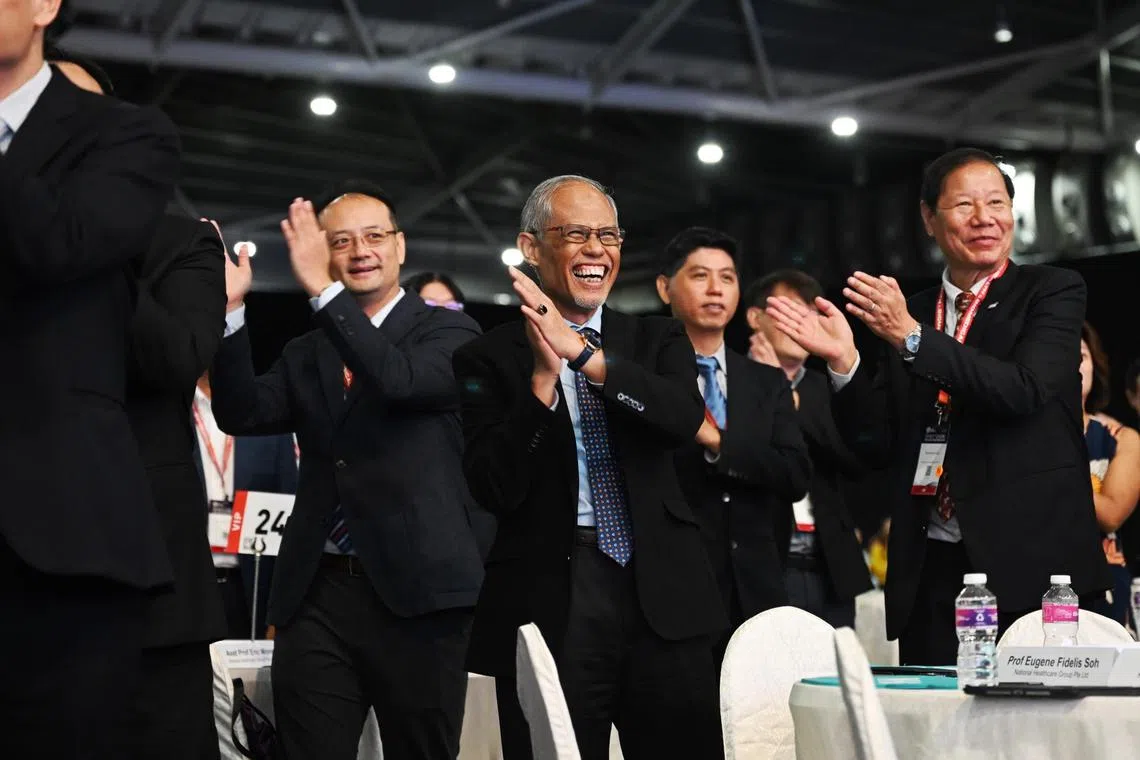Healthcare providers must work with range of partners to build healthier communities: Masagos
Sign up now: Get ST's newsletters delivered to your inbox

Second Minister for Health Masagos Zulkifli participating in a mass exercise with Group CEO of National Healthcare Group Professor Philip Choo (far right).
ST PHOTO: AZMI ATHNI
Follow topic:
SINGAPORE – Building healthier communities requires healthcare providers to work with a wide range of partners beyond the healthcare sector, said Second Minister for Health Masagos Zulkifli.
Noting that the authorities have been taking a broader view when it comes to population health – including looking at areas ranging from education to transport infrastructure – he said health is not confined within the walls of healthcare institutions.
“We need to leverage expertise from healthcare institutions and combine it with the community knowledge of organisations on the ground to deliver effective interventions,” said Mr Masagos, who is also Minister for Social and Family Development.
He was speaking on Thursday at the 21st Singapore Health and Biomedical Congress, organised by the National Healthcare Group (NHG) and held at the Singapore Expo.
Mr Masagos noted that NHG had worked with community partners to develop Health Kampung, a platform offering a directory of activities ranging from exercise classes to digital literacy workshops.
Health Kampung now offers more than 900 health and social programmes across central and northern Singapore, which NHG oversees, in collaboration with the healthcare cluster’s 28 partners, which include Awwa and St Luke’s ElderCare.
This is up from 450 when it was launched in April, said NHG group chief executive Philip Choo.
Professor Choo added that to make Health Kampung more accessible, it is now available through the NHG Cares app.
The app also allows patients to book and reschedule appointments, and offers resources for patients to improve their surgery outcomes.
The NHG Cares app has been downloaded more than 23,500 times, with more than 11,200 users registering for Health Kampung through the app.
Over the next year, more features will be introduced to make Health Kampung more personalised by recommending activities based on a user’s needs and interests, as well as allowing the user to form groups with others based on his or her interests.
In order to better plan programmes and services that meet the needs of residents, NHG is developing a portal that will allow its partners to update their programmes in Health Kampung in real time, as well as monitor sign-ups and attendance.
Technology can act as a “key enabler” for population health, which can be used to design policies and programmes to achieve positive health outcomes, said Mr Masagos.
He welcomed moves by the healthcare sector to work with industry partners, singling out a collaboration between the Singapore General Hospital (SGH), Tan Tock Seng Hospital and healthtech firm Mesh Bio to use predictive analytics to define diabetes states and predict progression of the disease.
“This allows clinical care to be delivered in a targeted manner and optimises limited health resources,” said Mr Masagos.
Prof Choo added that as at Oct 1, more than 150,000 residents across central and north Singapore have enrolled in preventive health initiative Healthier SG.
Separately, NHG provided an update on Connact Plus, a community-based programme that aims to enhance rehabilitation outcomes and optimise non-surgical treatments for seniors with knee osteoarthritis, a degenerative joint disease.
Conducted in partnership with community care providers such as St Luke’s ElderCare, the Collaborative Model of Care between Orthopaedics and Allied Healthcare Professionals (Connact) Plus programme has benefited 170 participants, 74.4 per cent of whom reported an improvement in pain outcomes.
Under the programme, patients with knee osteoarthritis undergo a 12-week programme where they attend weekly physiotherapy exercise sessions and classes related to the management of the condition.
Patients are encouraged to continue physiotherapy sessions at St Luke’s ElderCare centres or by joining existing community initiatives after completing the programme.
Almost 40 per cent of participants remain active in other community-based exercise programmes after completing the Connact Plus programme, with participants who underwent Connact Plus seeing a 36 per cent reduction in the risk for knee replacement surgery, compared with a control group.
The Straits Times previously reported that osteoarthritis affects up to 80 per cent of people aged 65 years and older here, with osteoarthritis patients making up about 90 per cent of the 1,800 knee replacement operations performed annually at SGH.

